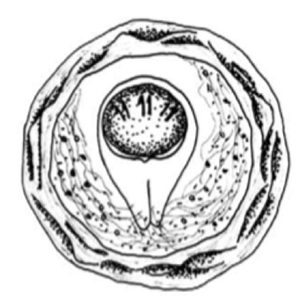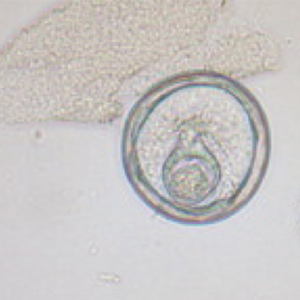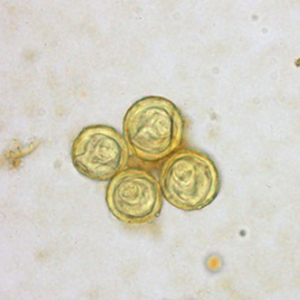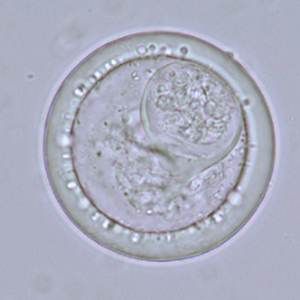Bertiella is a genus of cestodes belonging to the Anophlocephalidae family. They typically affect rodents, marsupials, and primates (Beveridge, 1985). Two species have been identified in non-human primates: Bertiella studeri and B. mucronate.
Epidemiology
Bertiella studeri affects Old-World Monkeys and Apes, including rhesus macaques (Macaca mulatta), crab-eating macaques (Macaca fascicularis), Formosan-rock macaques (Macaca cyclopis), baboons (Papio spp.), guenons (Cercopithecus spp.), gibbons (Hylobatids), chimpanzees (Pan troglotydes), and orangutans (Pongo pygmaeus). It can be found in Asia and Africa (Brack, 2002).
Bertiellea mucronate only affects New World Monkeys, namely Cebus, Alouatta, Callicebus and Saguinus spp. This species can be found in Central and South America (Brack, 2002).
Both species are known to be transmissible to humans (Brack, 2002).
Description
Bertiella eggs are round, transparent and measure between 35 and 50 µm in diameter. They have a thick outer membrane and contain an hexacanth embryo surrounded by a pyriform apparatus. Although B. mucronate eggs are often said to be smaller than B. studeri eggs (Global Health, Division of Parasitic Diseases and Malaria, 2019a), they are impossible to distinguish using ovodiagnosis only.
Differential diagnosis
Bertiella eggs are normally easy to identify, namely due to their characteristic hexacanth embryo surrounded by their pyriform apparatus (Furtado et al., 2012).
Clinical significance
Cestode infections are normally asymptomatic. Occasionally, they can cause diarrhea, abdominal pain and lethargy (Strait et al., 2012).
Prophylaxis and treatment
Bertiella are zoonotic cestodes, which can contaminate humans in case of intermediate host ingestion. Therefore, hygienic measures need to be taken in case of diagnosis and are often enough to mitigate the risk of propagation of the disease. Acaricide agents can also be used to limit the risk of infection in captive individuals.
Various treatments have been described to treat Bertiella infections in non-human primates, namely:
- Niclosamide: 100 mg/kg PO once (Strait et al., 2012);
- Bunamidine hydrochloride: 25-100 mg/kg once (Strait et al., 2012);
- Praziquantel: 5 mg/kg PO (Brack, 2002).





